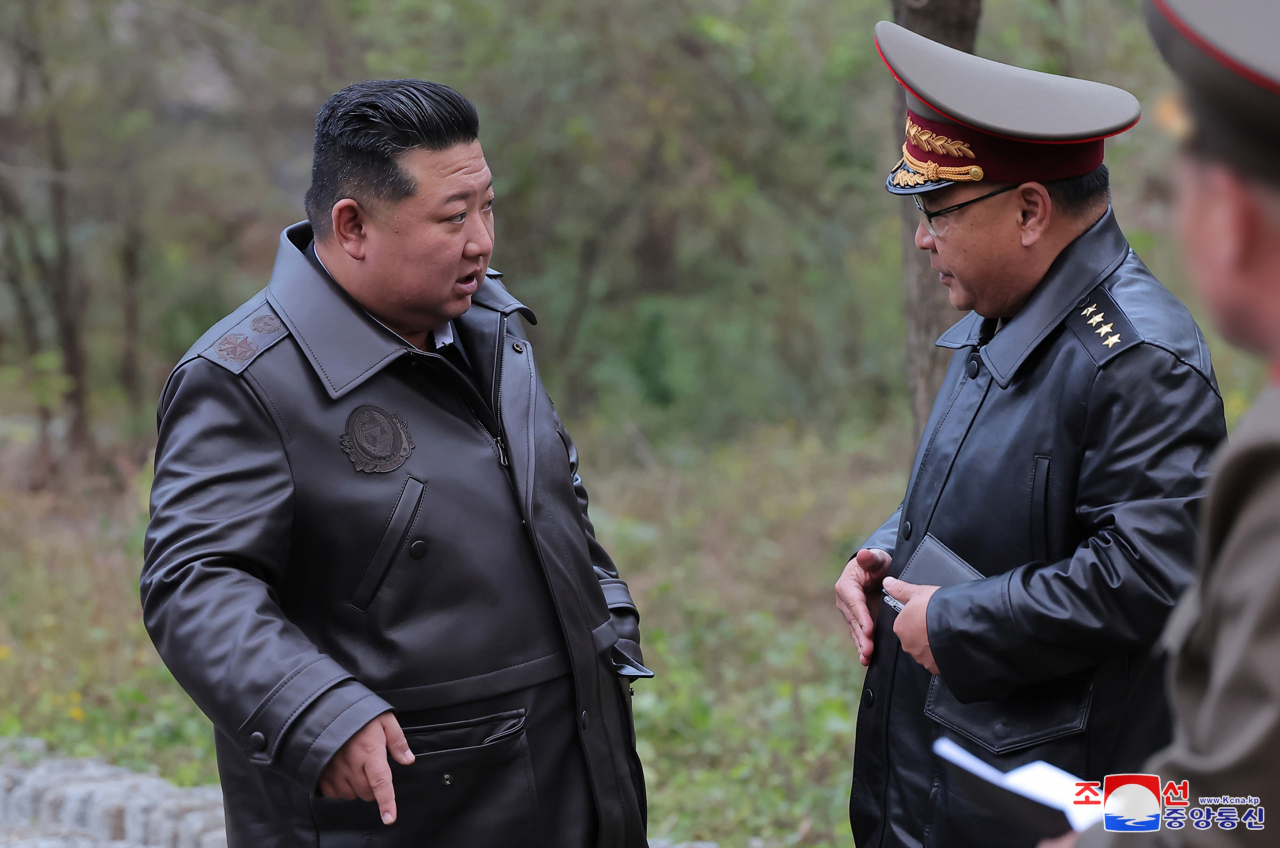 |
North Korean leader Kim Jong-un (left) inspects strategic missile bases, in this undated photo provided by North Korea's official Korean Central News Agency on Oct. 23, 2024. (Yonhap) |
South Korea's Unification Ministry on Tuesday released key details from 12 leaked diplomatic cables, revealing North Korean leader Kim Jong-un's direct orders -- transmitted through the Foreign Ministry to overseas missions -- to counter increasing international scrutiny and pressure on human rights, especially at the United Nations.
This marks the first public release of diplomatic telegrams -- confidential communications from North Korea’s Foreign Ministry to its embassies and foreign missions, not originally intended for public view -- according to the Unification Ministry.
Ri Il-gyu, who was North Korea’s No. 2 diplomat in Cuba before defecting to South Korea in November last year, handed over the texts of 12 internal cables dated from January 2016 to September 2023 to the South Korean government.
"The cables reveal instructions issued by North Korea’s Foreign Ministry before and after discussions on North Korean human rights at the UN, including sessions at the Human Rights Council, General Assembly, and UPR (Universal Periodic Review) and include reports from North Korea’s missions in Geneva and at the UN, detailing the outcomes of these discussions," the Unification Ministry said.
"These documents therefore provide insight into North Korea's stance and responses to international discussions on its human rights issues."
The 12 cables represent only a small portion of the diplomatic communications Ri brought to South Korea. The ministry had said it would share the full texts with the press, but later chose not to at Ri's request.
“I want to emphasize that this is essentially a North Korean version of a WikiLeaks-style document leak,” a senior Unification Ministry official said during a press briefing on condition of anonymity.
The leaked cables reveal Kim Jong-un’s direct, detailed instructions issued through North Korea’s Foreign Ministry to guide actions taken by its overseas missions, particularly at the UN.
For example, on Feb. 11, 2016, Kim ordered North Korea’s UN mission in Geneva to declare a complete rejection of the North Korean human rights resolution and withdraw from participation at the 31st Human Rights Council session.
Kim's directive was formally relayed in the diplomatic cable entitled "Guidance on Human Rights Vote" from the Foreign Ministry on Feb. 13, 2016.
According to the diplomatic telegram titled “Human Rights Activity” from North Korea’s Foreign Ministry dated Nov. 2, 2016, Kim instructed on Nov. 1 that North Korea should declare its complete rejection of the North Korean human rights resolution at the 71st UN General Assembly's Third Committee and then exit after making its stance clear.
In the diplomatic telegram titled "Guidance on Policy Directives" dated Jan. 11, 2017, Kim ordered a vigorous campaign to politically and socially ostracize defectors and discredit their testimonies. The campaign would also aim to create the impression among human rights organizations and third parties that they would be unable to engage in dialogue with North Korea if they relied on defector testimonies.
In another diplomatic cable on Feb. 11, 2020, North Korea's mission to the UN in Geneva was instructed to claim during the 43rd UN Human Rights Council session that "ulterior attacks" were being mounted against North Korea's human rights situation aims at overthrowing the Kim regime under the pretext of human rights.
The Unification Ministry analyzed that the leaked diplomatic telegrams indicated “Kim Jong-un's significant interest in Western discussions on North Korean human rights, including issuing direct instructions."
The telegrams also disclosed the Kim regime's "extreme sense of wariness regarding defector testimonies and activities," according to the ministry.
North Korea also "attempted to establish a coalition of developing countries against Western pressure on North Korean human rights" by "framing human rights discussions as a conflict between developed and developing countries," the ministry revealed in another set of telegrams.
The cables also indicate North Korea's "perception of declining support among allied nations due to discussions on North Korean human rights."
When asked by The Korea Herald, the unnamed senior official stated that the South Korean government had not conducted a formal process to verify the authenticity of the diplomatic cables or determine whether they were partially fabricated. But the official said that the volume of the cables is "too extensive to disregard," suggesting that the sheer number of telegrams provided by Ri made the likelihood of fabrication almost zero.






![[Herald Interview] How Gopizza got big in India](http://res.heraldm.com/phpwas/restmb_idxmake.php?idx=644&simg=/content/image/2024/11/20/20241120050057_0.jpg)
